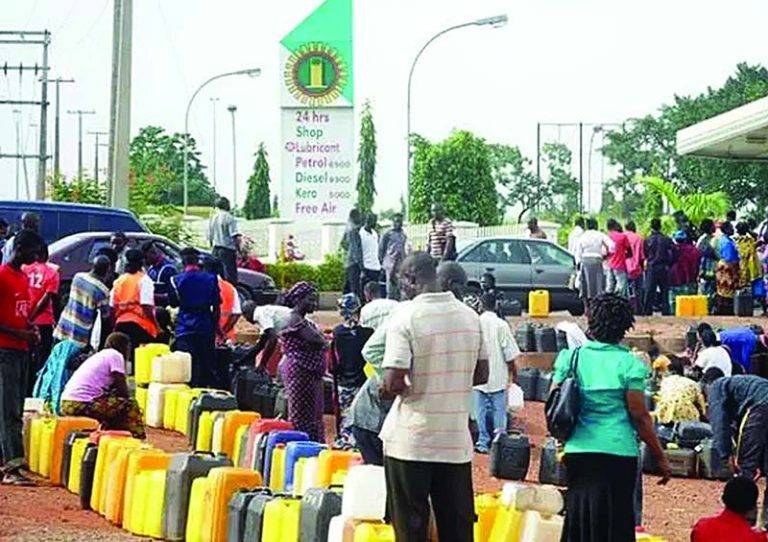The nation’s fuel shortage has intensified, leading to the closure of many filling stations and creating long queues at the few stations with available stock. The situation has resulted in increased panic buying across Lagos and other major cities.
Illegal fuel operators have taken advantage of the situation, selling petrol along major roads such as Ikorodu Road, Maryland, and Marina. The absence of enforcement by the Nigerian Midstream and Downstream Regulatory Authority (NMDRA) has exacerbated the problem.
In Abuja, the situation has deteriorated further, with many filling stations, including those owned by major marketers, running out of stock. Black market prices have surged to N1,500 per litre. However, NNPC Retail mega stations and NIPCO stations continue to dispense fuel, albeit with long queues.
The Nigerian National Petroleum Company (NNPC) Limited has attributed the supply difficulties to logistics challenges and flooding in coastal areas. Despite government assurances that the issues are being resolved, the fuel crisis has persisted for six days.
Senator Heineken Lokpobiri, the Minister of State for Petroleum Resources (Oil), addressed the issue on social media, acknowledging the frustration caused by the fuel queues. He attributed the disruptions to recent flooding and logistical challenges and assured the public that efforts are underway to restore normal fuel supply.
Festus Osifo, President General of the Trade Union Congress (TUC) and President of the Petroleum and Natural Gas Senior Staff Association of Nigeria (PENGASSAN), urged the federal government to address the logistics, weather, and other issues hindering fuel supply. He emphasized the need for a long-term solution to prevent recurring fuel shortages, such as improving infrastructure and using pipelines and railways for fuel distribution.
Billy Gillis-Harry, National President of the Petroleum Products Retail Outlets Owners Association of Nigeria (PETROAN), confirmed that the NNPC has not changed its prices. He explained that the recent price hikes by independent marketers are due to the costs incurred from sourcing fuel from depots.
Gillis-Harry also highlighted the rising cost and scarcity of diesel, which complicates logistics for fuel distribution. He called for government subsidies to ease these costs. Additionally, he pointed to forex shortages as a major impediment to the importation of petroleum products, stressing the need for foreign exchange availability to support deregulation efforts.
Despite the challenges, Gillis-Harry urged Nigerians to remain patient, assuring that the current fuel shortages would be resolved soon.




